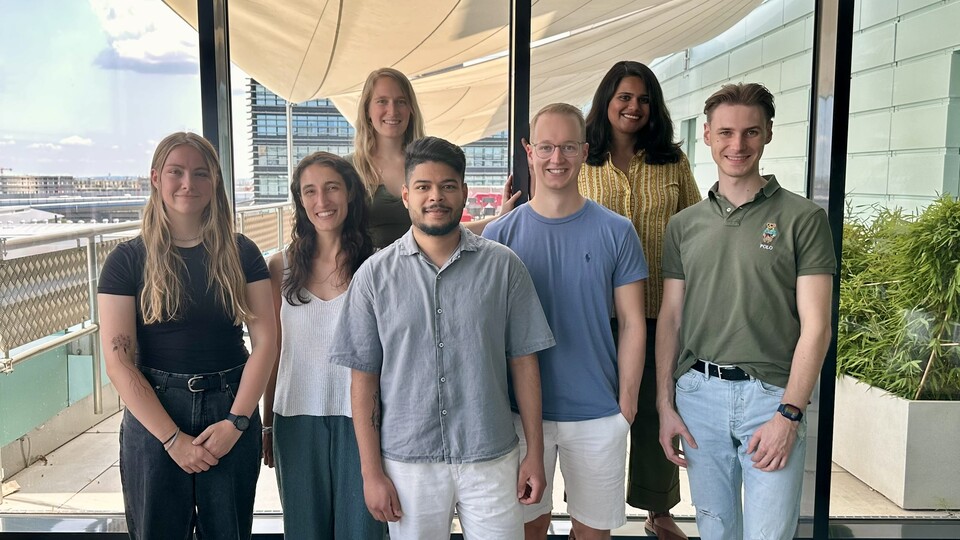
Maintaining RNA balance is essential for neurons to function properly – and when this balance is disrupted, it may lie at the heart of neurodegenerative diseases like Parkinson’s (PD). Kathleen Berkun, a PhD student in the Hallacli lab since June 2024, is investigating how processing bodies contribute to RNA regulation in both healthy and PD-affected neurons. “By uncovering how α-synuclein – the key protein altered in PD – interacts with the scaffold protein of the decapping complex in processing bodies, we hope to reveal new mechanisms of RNA dysregulation and neuronal toxicity”, she explains. Originally from Albany, New York, U.S., Kathleen studied Cognitive Science at McGill University in Montreal, Canada, before completing her Master’s in Europe through the Erasmus Mundus program in Biosciences and Bioengineering for Precision Medicine awarded by Université Grenoble Alpes (France), Universitat de Barcelona (Spain), and Università degli Studi di Napoli Federico II (Italy).
Understanding how α-synuclein is distributed between cellular membranes and the cytosol may provide key insights into the mechanisms of PD. PhD student Elizabeth Ethier, who also joined the Hallacli lab in June 2024, aims to reveal novel pathways that connect membrane dynamics with RNA processing through processing bodies in her PhD project. She is exploring these dynamics using a custom-designed fluorescent reporter system, along with CRISPRi and small molecule screens. She says: “Uncovering the mechanisms that control α-synuclein’s localization could establish new links between lipid biology and RNA regulation in neurodegeneration.” Elizabeth, who grew up in Rhode Island, U.S., obtained her undergraduate degree in Behavioral Neuroscience at Northeastern University in Boston, U.S., before moving to Vienna.
How enhancers influence the dynamics of gene expression is a central question in gene regulation. María García Gallardo has been studying for her PhD in the Buecker lab since May 2023, where she aims to understand how the position and sequence of enhancer elements affect transcriptional bursting in mouse embryonic stem cells. “Using live-cell imaging and single-molecule RNA FISH, I can observe transcriptional bursting in real time and study how it is shaped by different enhancers at different positions”, she explains. Originally from Valladolid in Spain, María studied Chemistry at the University of Valladolid, followed by a Master’s in Biotechnology of Environment and Health at the University of Oviedo, Spain. She also trained across Europe through Erasmus programs and completed an internship at EMBL in Heidelberg, Germany, before joining the Max Perutz Labs.
What makes the tiny, conserved protein ERH so essential for life? Aswini Kumar Panda, who joined the Falk lab in September 2023, is investigating the molecular function of Enhancer of Rudimentary (ERH), a protein critical for key nuclear processes in human cells. “Although ERH is indispensable, we still don’t fully understand how it works – and our goal is to uncover its molecular roles using a combination of structural and cell biology approaches”, he explains. Aswini is from India and completed his integrated Bachelor’s and Master’s degree in Biological Sciences from the Indian Institute of Science Education and Research (IISER) in Bhopal. He joined the Perutz in April 2023 and began his PhD in the Falk lab later that year.
Viruses need to hijack and reshape the host cell to successfully replicate. Sebastian Platzer’s PhD project focuses on how Poxviruses remodel the host cell’s proteome to create replication factories – specialized membrane-enclosed compartments where the viral genome synthesis takes place – and how they take over the host's ubiquitination machinery. “By systematically analyzing how Poxviruses manipulate the host’s proteome across different scales, we aim to reveal new viral strategies for controlling cellular processes”, Sebastian explains. Born and raised in Vienna, Sebastian earned both his Bachelor’s in Biology and Master’s in Molecular Biology at the University of Vienna, completing research projects at the Max Perutz Labs and the Institute of Molecular Biotechnology (IMBA). Sebastian began his PhD in the Hein lab in May 2023.
Exploring the functional implications of ISGylation during innate immune activation is central to Kavya Shetty’s PhD research. ISGylation, triggered by infection, is a process in which the ubiquitin‑like modifier ISG15 binds to hundreds of proteins through its dedicated E1, E2, and E3 enzymes. Kavya explains, “Investigating ISGylation on a system‑wide level will help us better understand how this modification shapes the antiviral response and why some viruses attempt to evade it.” Kavya is from Mumbai, India, and completed her Master's in Biotechnology at the Amrita School of Biotechnology in Kerala. She joined the Perutz as the first PhD student of the Hein lab in February 2023.
Transposase proteins play a crucial role in processing and regulating DNA, yet the precise mechanisms behind their function remain unclear. Mateusz Walter, PhD student in the Querques lab, is dedicated to understanding these molecular details to advance the development of next-generation genome editing tools. “Our goal is to unlock how transposases interact with and process DNA, opening new avenues for innovative genome engineering technologies”, Mateusz explains. Originally from Poland, he completed an Integrated Master’s Program in Biochemistry at the University of Bristol, U.K. Mateusz started his PhD at the Max Perutz Labs in the Querques Lab in September 2023.